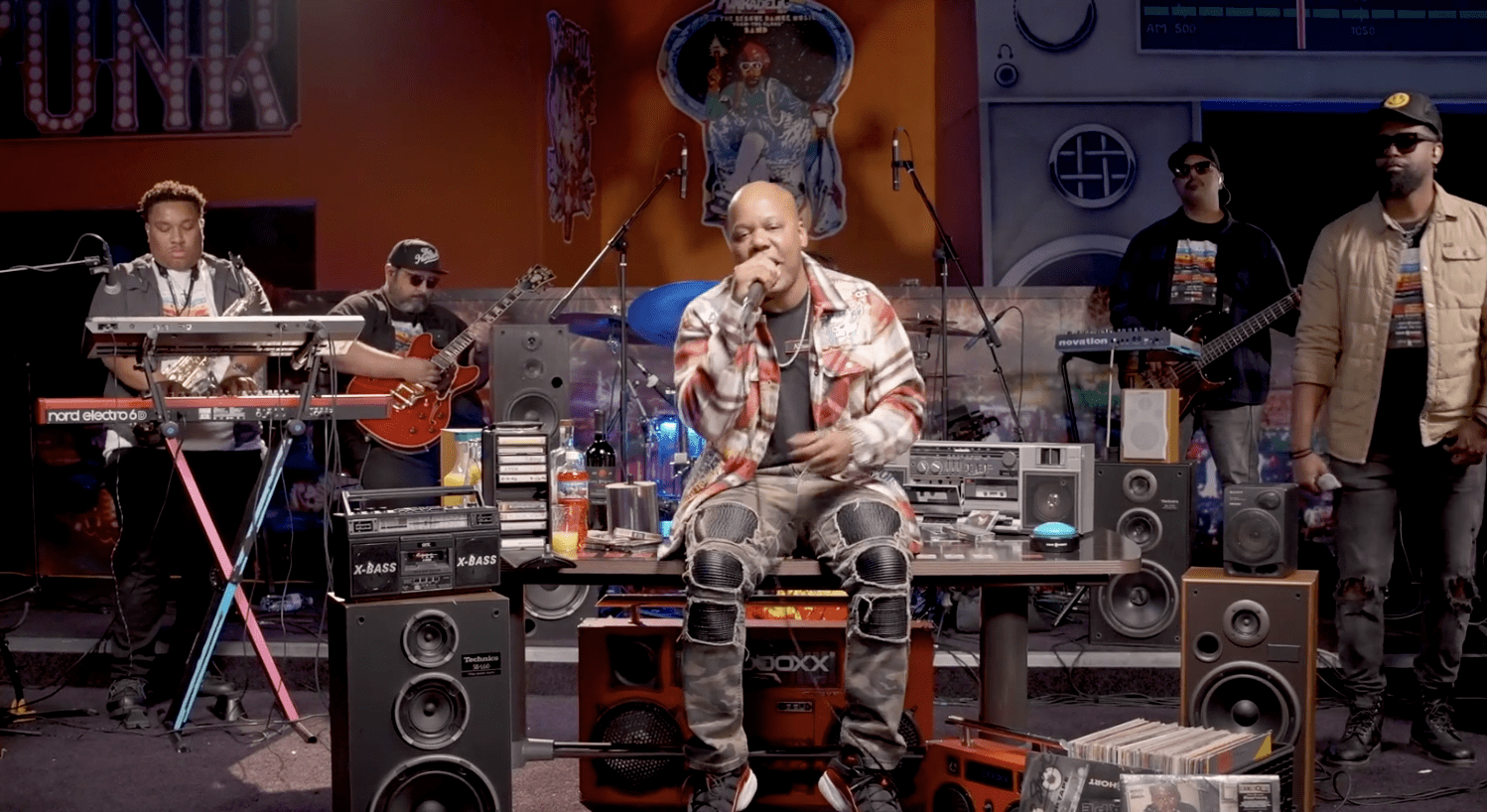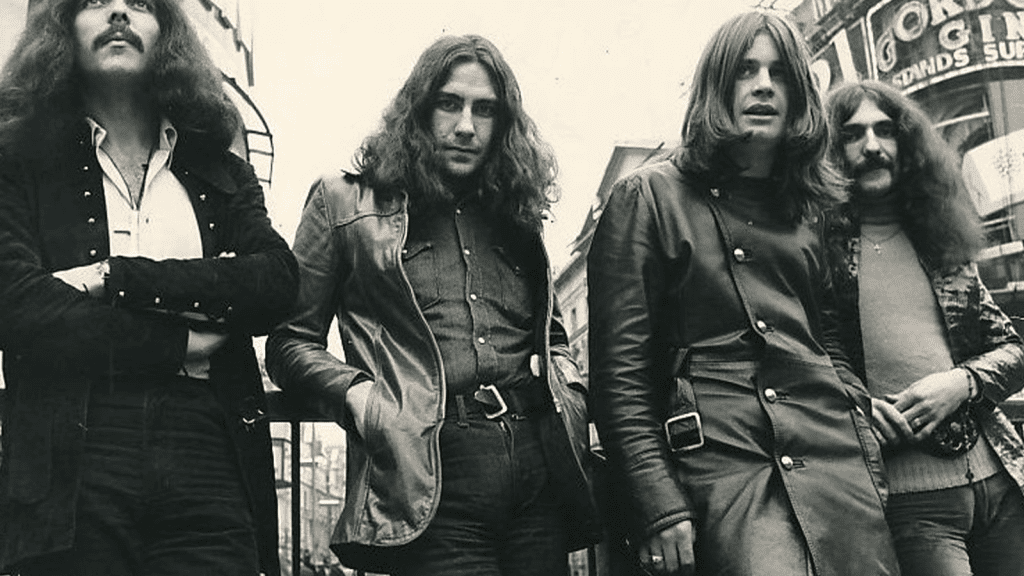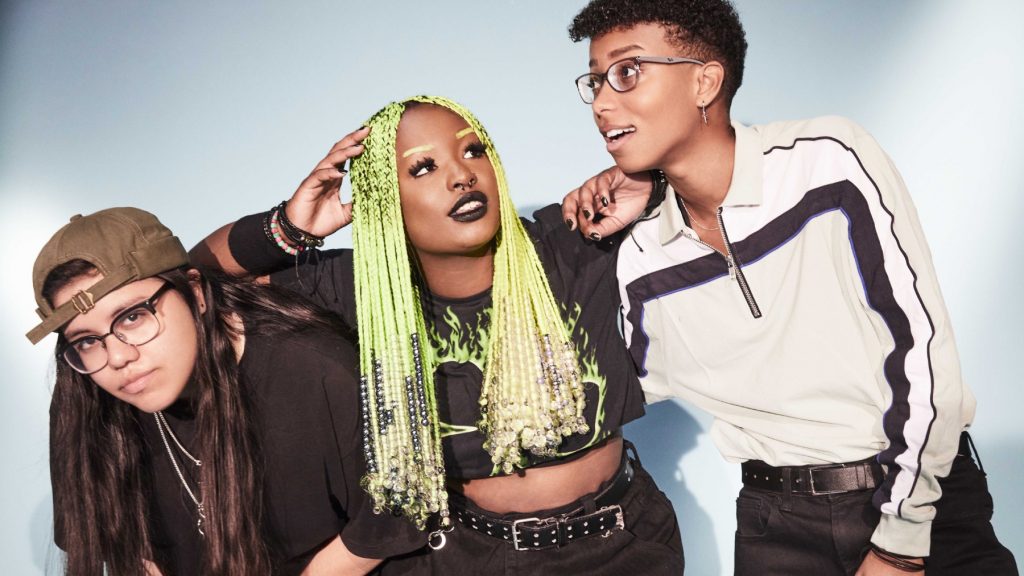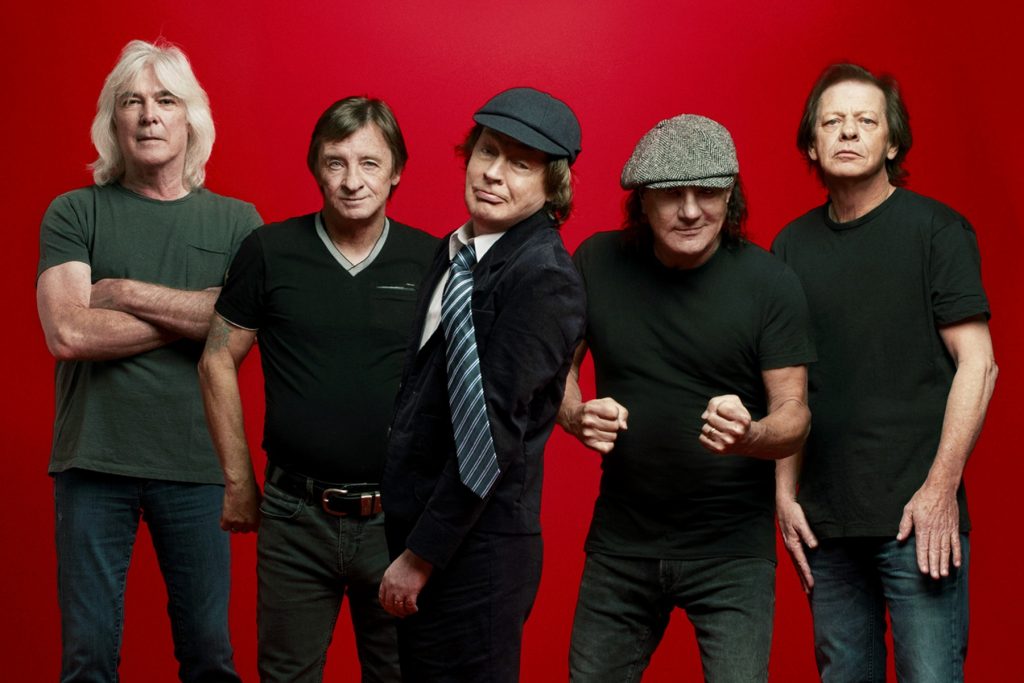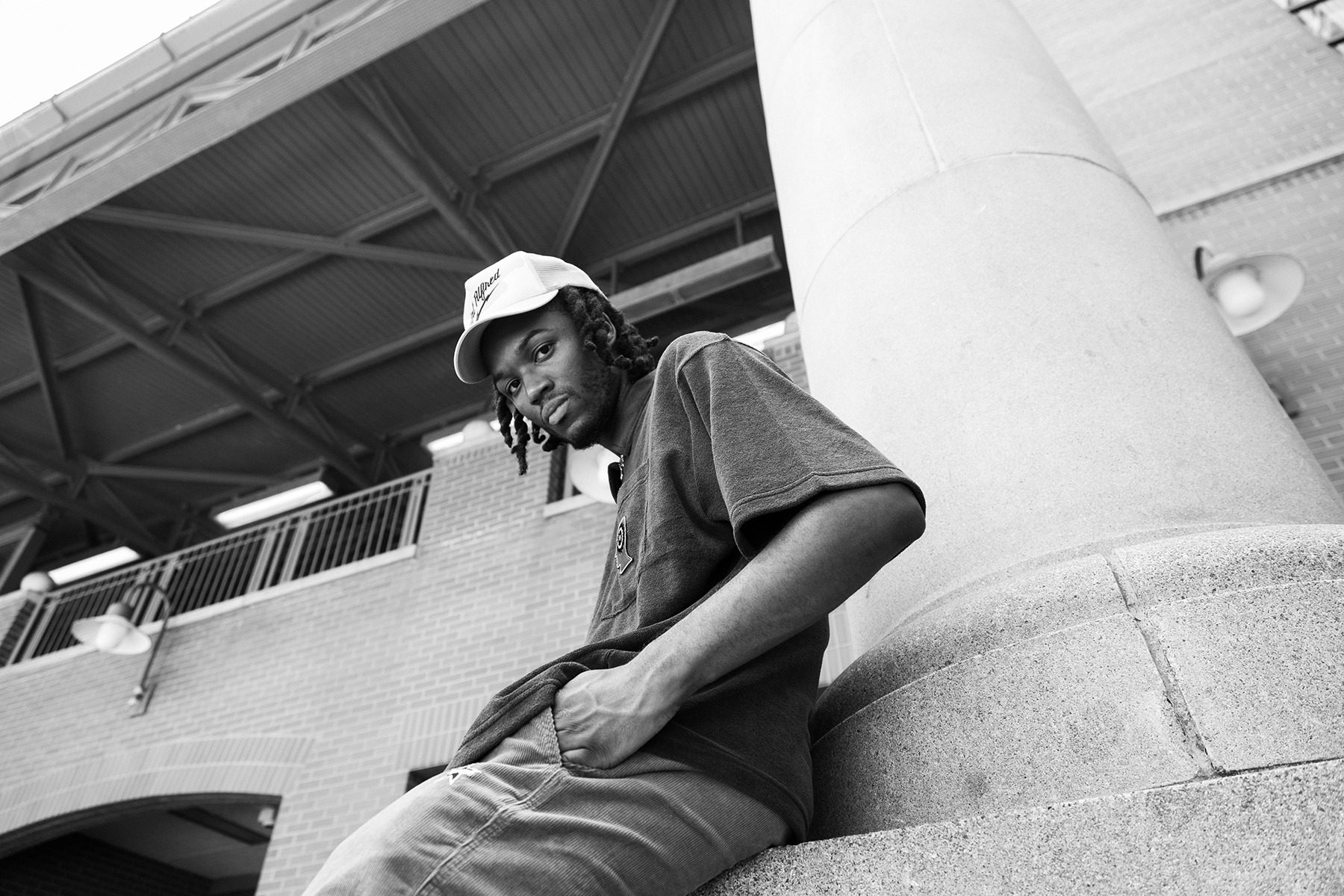
Saba Is Building a Life, Bar By Bar
“The first time I bought a house — a home — was, like, a week ago,” Saba says, tightening up for his laptop’s camera after gently rocking with laughter. He’s positioned in front of a blank white wall of his new Los Angeles abode. At one point, he darts off camera to ensure he’s ready for the people coming to work on the place today.
When the house question came up in a IndieLand video interview about some of his first professional and personal experiences, his first reaction was to inquire, with amused suspicion, if one of his managers put me up to it — and, to be completely honest, his team did mention the house thing. But it’s also a natural question in the context of Few Good Things, Saba’s excellent new album.
Few Good Things is his third full-length release, and it follows nearly four years that Saba spent making music, growing up, and losing another friend to violence in his native Chicago. His acclaimed 2018 album Care For Me meditates on the loss of his cousin and collaborator John Walt; the new album was almost completed when another close collaborator, producer Squeak, was killed.
blogherads.adq.push(function () {
blogherads
.defineSlot( ‘medrec’, ‘gpt-mob-article-inbody1-uid0’ )
.setTargeting( ‘pos’, [“mid-article”,”mid”,”in-article1″,”mid-article1″] )
.setSubAdUnitPath(“music//article//inbody1”)
.addSize([[300,250],[2,2],[3,3],[300,461],[320,480],[2,4],[4,2],[300,400]])
;
});
Saba, 27, was born Tahj Malik Chandler and grew up poor on the West Side of Chicago, in a neighborhood called Austin. Despite what his family may have lacked, there was no dearth of talent. His dad is a neo-soul musician who sang background for Saba’s 2018 Tiny Desk Concert; his uncle is a hip-hop producer; two of his grandparents were in a funk band, and so on — music permeates his lineage.
Saba was around 16 years old when, along with some friends and family members near his age, he built a studio in his grandmother’s basement to record their own music as the collective Pivot Gang. He recorded his friend Noname’s music down there, too. Alongside other pensive Chicago acts like her and Chance the Rapper, Saba turned his local, independent career into a national, independent one, appearing on songs with his high-profile friends, releasing his debut album, Bucket List Project, in 2016, and headlining a North American tour. Six years and a lot of work later, Saba has reached an elusive pinnacle in independent artistry: getting big enough to buy a house off of it.
Few Good Things contends with that security — the necessity, the memory, the elusiveness. Through the album and its accompanying film, a physical home belonging to his great-grandmother acts as a symbol of precarious stability. That home was lost after Saba’s great-grandmother’s death more than a decade ago, the family unable to keep up with the costs of maintaining it. “When Granny fought for her property, she would turn down any cause,” Saba raps on album opener “Free Samples,” commemorating the matriarch’s strong will against forces eager to displace a Black woman. “It was the city at a point, it was a restaurant at a point. Just a bunch of different suitors throughout my childhood. But I remember her being like, ‘Nope. Nope. Nope,’” he explains, leaning back, arms folded, head shaking, as if to mimic her resolve.
blogherads.adq.push(function () {
blogherads
.defineSlot( ‘medrec’, ‘gpt-mob-article-inbody2-uid1’ )
.setTargeting( ‘pos’, [“mid-article2″,”mid”,”in-article2″,”mid-article”] )
.setSubAdUnitPath(“music//article//inbody2”)
.addSize([[300,250],[300,251],[2,4],[4,2],[320,480],[3,3],[2,2]])
.setLazyLoadMultiplier(2)
;
});
While Saba boasts about his newfound financial footing on Few Good Things, he also laments that generational wealth, safety, and certainty aren’t more widely available. He says a conversation with Noname illuminated the discrepancies in his attitudes across the project. On the dark and brash “Stop That,” Saba confidently chases paper, but the bouncy funk track “Fearmonger” is plagued with anxious bars about losing it all.
“There are absolutely moments of contradiction on this album, but I don’t shy away from it, because there are moments of contradiction in my life every day,” Saba says. “Especially as it pertains to money and being a rapper and finding success in this path, it’s so up, down. You feel all of that shit.”
What would you say was the importance of your great-grandmother’s home? Is it having a central place to gather? Is it having something to pass down?
It’s all of the above. When I think back on how much time we spent over there, it was the place where the family would gather. It was how I saw a lot of my cousins. There are cousins that I literally haven’t seen since my great-grandma passed.
The act of being able to pass down something generationally is beautiful, and it’s something that people are starting to talk about now. It’s not that you have to pass something as grand as a house, but it’s the possibility of being able to, I think, that is more important. To just be in a position [where] if you leave, you have something to leave your loved ones. It’s a really amazing gesture that is hard to do.
Financial anxieties are so salient on the album. Are you feeling a little bit more at peace now?
I started therapy working on this album, and that was the thing that kept coming up. I don’t know that it’s a thing that goes away. I think it is partially just hood shit, just coming from poverty the way we have. To experience anything other than that feels crazy. It feels crazy, and a lot of the anxiety lies in that. It feels unusual to not be struggling in a certain way. A lot of my close friends still are. A lot of people that I love and hold dear to me still are. I got people in Chicago that are still right there, so it’s not a thing that has gone away, it’s just a thing that I’m trying my best to get better at dealing with.
blogherads.adq.push(function () {
blogherads
.defineSlot( ‘medrec’, ‘gpt-mob-article-inbodyX-uid2’ )
.setTargeting( ‘pos’, [“mid”,”mid-articleX”,”in-articleX”,”mid-article”] )
.setSubAdUnitPath(“music//article//inbodyX”)
.addSize([[300,250],[300,251],[3,3],[2,2]])
.setLazyLoadMultiplier(2)
;
});
A lot of shit is not my responsibility. That’s what I’m having to learn, because with this kind of life, it’s like you want to bring everybody. You want to bring everybody because even the most minuscule version of this is going to be better than what a lot of people are dealing with at home, and knowing that it makes it hard not to want to help. That’s where a lot of anxiety comes from, is just the over-extending and countless helping. You feel like it’s on you because you’re the one who did it. You know?
I can imagine, in turn, that makes you think, How did everybody get here? Maybe that’s where the generational concerns come in. Why is it that everybody I know is in this same predicament? And even though our elders tried, they weren’t able to change outcomes in a way that makes that burden smaller.
That’s really what it is, though. It’s exactly that.
The way you talk about money and material things on this album is very dynamic. It sounds like some of the anxieties are quelled because you have money, and there’s celebratory moments — but there’s also new anxieties that come from having money, and there are the old ones that you haven’t gotten rid of.
Right. When I think of my music, it’s not supposed to answer a question. It’s just supposed to ask the question, or say whatever’s on my mind. I talked to Noname about this a few months before I played her the album. Coming from what we all came from, it’s like living a double life, so it’s hard for any album I make, I feel like, to be one thing. There’s going to be moments of, “Well, this is what I think today, even though that was what I thought yesterday.” When I think of all the financial lines on the album, they’re all there, but they don’t necessarily all line up to answer your question, or a question in general.
Do you have any family in L.A.?
I’m out here with my brother [Pivot Gang rapper Joseph Chilliams]. I got distant cousins and shit, but I don’t know them.
How does it feel to be so far from home?
It’s not a thing that I really think about too often, to be honest. I miss people back home, but my relationship with the city of Chicago is such a love/hate relationship that I need to not be there right now, so I’m not. I’m not super-eager to get back. I’m super-eager to see my people.
blogherads.adq.push(function () {
blogherads
.defineSlot( ‘medrec’, ‘gpt-mob-article-inbodyX-uid3’ )
.setTargeting( ‘pos’, [“mid”,”mid-articleX”,”in-articleX”,”mid-article”] )
.setSubAdUnitPath(“music//article//inbodyX”)
.addSize([[300,250],[300,251],[3,3],[2,2]])
.setLazyLoadMultiplier(2)
;
});
Another theme on the album is searching for regularity in irregular circumstances. I think about “Still,” and SiR’s hook where he’s counting all the ways his life is the same. At the same time, the album is soundtracking things that are changing in your life.
When I think of myself, as much as I love what I do, I also love being home. I love being able to go to the grocery store. Some people strive to never be able to go to the grocery store. I love being able to do shit like that — just the regularness. I don’t think that’s a word, but just doing regular shit.
When I think of “Simpler Time,” it’s a song where I feel like shit is moving and it’s changing. That’s the constant throughout my life and everybody else’s, is that something is changing. I think you take for granted that simple shit — being able to relax, being able to work, even. There are some jobs that I get a sense of nostalgia thinking about, or just random, miserable times that were awful, but there’s some beauty in it, where we managed to make that fun somehow.
Things like that repeat on the album a lot. Things that didn’t stand out as memories automatically stand out when there are less people there. It’s like, “Damn. Remember when?” And it could be the most random story, but it’s going to be a big deal because it’s like, “Wow. Our friend isn’t here anymore.”
I really feel for you and for your friends and family that have dealt with a lot of loss over the past few years. One of the other things that I hear on the album is thoughts about safety: your safety and the safety of people around you. How are you feeling about that these days?
It’s hard to feel safe when shit like that has happened to us. [Safety] would be just as important as time to me when I think of wealth. If you got to constantly look over your shoulder, if you got to do things like that, you can’t be wealthy. You can’t be wealthy because that’s not a part of it. This is just my understanding. I don’t know what the dictionary says.
On “2012,” it sounds like you’re reminiscing on living in Chicago, life being simpler, but then there’s also been a lot of loss in that city for you.
And that’s the thing that makes it hard to answer, when I think of safety and my own safety. If my friends aren’t safe, I don’t feel safe. That’s part of my safety. So it’s just a challenging question to answer in not just this interview, but in real life. I’m still trying to figure out the damn answer to that one.
blogherads.adq.push(function () {
blogherads
.defineSlot( ‘medrec’, ‘gpt-mob-article-inbodyX-uid4’ )
.setTargeting( ‘pos’, [“mid”,”mid-articleX”,”in-articleX”,”mid-article”] )
.setSubAdUnitPath(“music//article//inbodyX”)
.addSize([[300,250],[300,251],[3,3],[2,2]])
.setLazyLoadMultiplier(2)
;
});
In the making of this album, were you experiencing grief differently than you have at other points in your life?
Grief is such a wild concept. It feels like talking about aliens or something, where it’s like, I know it exists, but I don’t understand it. You know? Making this project, I don’t feel like grief was a focal point in my life, and finishing this project, grief became that again. It’s like my last few months don’t make sense, and I don’t try to make them make sense. I’m going with the flow, at this point. It’s strange, these songs that I worked on were just things on my mind.
I got to, for instance, play the whole album for Squeak. You know what I’m saying? That shit is so eerie and weird, and it just doesn’t make sense to me. That’s part of why when we were talking about Chicago, I’m like, “I got a love/hate relationship with the whole city.” It’s just inhumane, the shit that we go through. People aren’t really supposed to deal with this. Everybody deals with grief, but when that shit’s not natural, it’s like it leaves you just… I don’t know.
Do you remember how Squeak felt about the album?
He broke down. I played him the album and he just broke down.
What about it moved him? Did he tell you?
“2012,” because I’m talking about him on that song, because he stayed with us briefly. it’s just such an eerie thing to have played all of that, and then I don’t even think it might have been two weeks later to get the call that I got. It’s just fucking unreal still. But the beautiful part about making an album like this is…Some people, you lose somebody and you wish you could have had certain conversations. You wish you could have said certain things. I know that most of the people that I’ve lost, I got to share words and love and that connection prior, and I’m just really grateful for that. Having that moment, seeing anybody, let alone one of my homies, react to words that I said the way that he did, it lets me know that no, this is some powerful shit.

